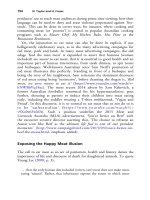The palgrave international handbook of a 201
Bạn đang xem bản rút gọn của tài liệu. Xem và tải ngay bản đầy đủ của tài liệu tại đây (38.76 KB, 1 trang )
194
N. Taylor and H. Fraser
producers’ use to reach mass audiences during prime time viewing; how their
language can be used to deny and erase violence perpetrated against ‘livestock’. This can be done in covert ways, for instance, where cooking and
consuming meat (or ‘protein’) is central to popular Australian cooking
programs such as Master Chef, My Kitchen Rules, Hot Plate or the
Restaurant Revolution.
Yet, the injunction to eat meat can also be done in explicit, if not
belligerently celebratory ways, as in the many advertising campaigns for
red meat, pork and lamb. In many meat advertising campaigns, the old
adage ‘feed the man meat’ is expanded to assert that humans (women
included) are meant to eat meat; that it is essential to good health and an
important part of human interactions, from steak dinners, to spit roasts
and barbeques. Well-known Australian actor Sam Neill’s promotion of
red meat illustrates this perfectly. Standing in front of a barbeque and
being the envy of his neighbours, Sam reiterates the dominant discourse
of red meat eating being ‘instinctive’, before chanting the slogan is, ‘Red
meat, we were meant to eat it’ ( />hNWB6Vq18xc). The more recent 2014 advert by Sam Kekovich, a
former Australian footballer renowned for his hypermasculinity, goes
further, shouting at parents to induct their children into meat eating
early, including the toddler wearing a T-shirt emblazoned, ‘Vegan and
Proud’. In this discourse, it is so normal to eat meat that to not do so is
to be ‘unAustralian’ ( />v9Xo0v63wMA). Such a position underlies the 2015 Meat and
Livestock Australia (MLA) advertisement, ‘You’re better on Beef’ with
the executive creative director asserting that, ‘The chance to reframe an
Aussie icon like Beef as the ultimate life fuel is one of our proudest
moments’ ( emphasis added).
Exposing the Happy Meat Illusion
The call to eat meat as an act of patriotism, health and history denies the
importance of life and discourse of death for slaughtered animals. To quote
Young Lee (2008, p. 3),
. . . that the early human diet included (rotten, raw) meat does not make meateating ‘natural’. Rather, that inheritance exposes the extent to which meat-









